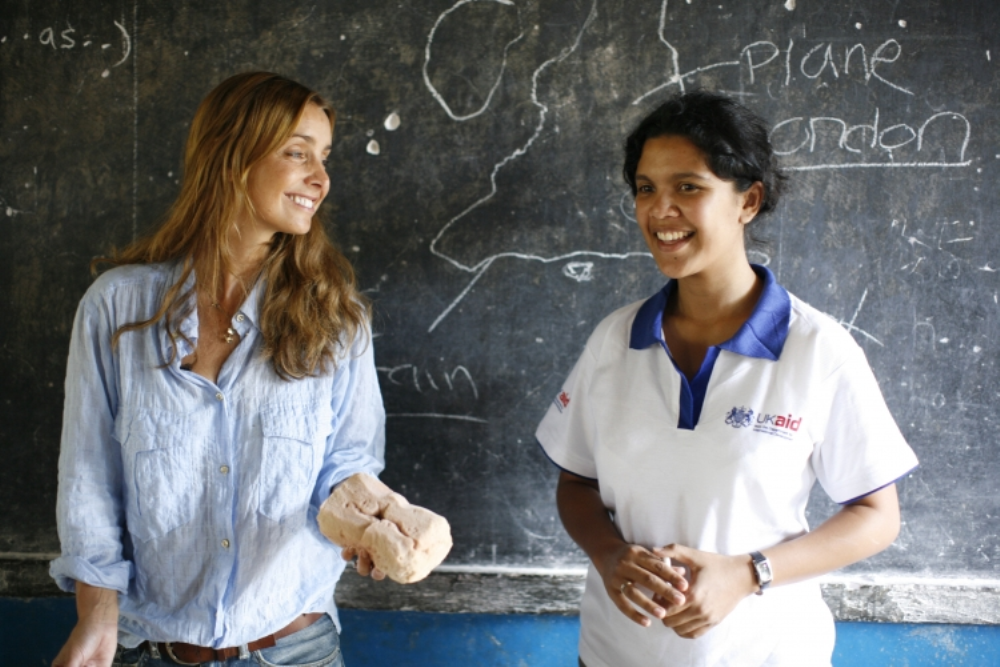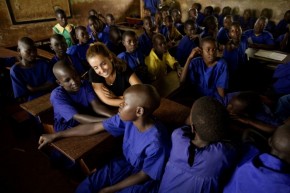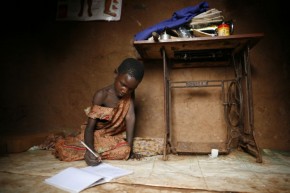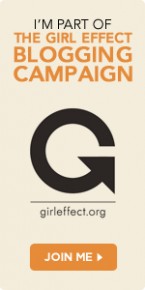
Before I went to Uganda, I felt a confused mixture of anticipation, excitement and fear. It was my first time visiting one of the projects that Comic Relief supports and I had absolutely no idea what to expect.
I’ve watched Comic Relief for years and seen lots of its films, but it's hard to imagine what you'll see and experience until you're actually there. I went to see how money raised by the British public for Red Nose Day and supported by the Government is already hard at work changing lives.
We landed in Entebbe in the early morning and headed straight to Jinja, two hours east of Uganda's capital city, Kampala - give or take a few hours, depending on the traffic! We were due to visit Jinja Women's Association which is funded by Comic Relief with money matched by the UK Government.
The project works with women and girls in and around Jinja to help ensure they get an education. In Uganda, education is free for everyone until the end of primary school, which is when children are around 13 years old. The project staff told me that this has been in place for five years, thanks to the Ugandan government, and has made a huge difference to education in Uganda. But there are still things stopping girls in particular getting to school and this is what the project is trying to tackle.
Anne, the project manager for the Jinja Women’s Association, explained that girls in Uganda often miss out on school because of pregnancy, early marriage and poverty. This has far-reaching consequences, not just for their future income, but for their health, and even the health of their children.
This is where the project comes in and helps make a difference. It has already helped more than 7,000 girls and young women, giving them life skills training to improve their confidence and skills and help them stay in school. It also works with local leaders and community groups to support girls and women who might be experiencing domestic abuse and to look at the reasons why so many girls are forced to drop out of school.

It was inspiring to see their work and I felt overwhelmed when we arrived at one of the schools and there were happy kids running towards us to greet us. These are children so excited to be at school and learning that they’re making up songs about it that they want to sing to us! We walked around the school and I sat in on some lessons. All the classes are bursting with children and the Headmaster said that some classes are as big as 100 children. I can't imagine any of the children back at home being this well behaved in a class of 100, but here I'm amazed by how good they are.
At break time the classes spill out into the field and hundreds of children play just like children at home. It makes me realise that as well as giving these children an education, projects like this are helping to give them a childhood as well.
During my visit, Anne introduced me to Dina who is 12 and is being helped by the project. She was quite shy when I first spoke to her, but as soon as I talked to her about going to school and what it means to her, she lit up. I asked her what she wants to be when she's older and immediately she said that she wants to be a teacher so she can help to teach the next generation. While I was in the classroom I asked a lot of the girls what they wanted to be and all the answers were doctors, nurses, lawyers or teachers. These girls have got huge aspirations and it's amazing to see.
Dina took me back to her home to show me where she lives and to meet her Mum. Although I had kind of expected that things would be simple, I was really taken aback at just how basic the homes are. The houses are nothing more than a room that they all sleep and live in. It's really clear just how poor the families are when you see it like this. Dina lives with her parents, four brothers and one sister in a tiny house in a slum area of Jinja. Life is really hard for them, but what was lovely to see was how proud Dina’s mum is of her daughter for getting an education.

While Dina was showing me round her house I asked her why it's important for girls to get an education. For someone who is only 12, I was really impressed with her answer - she said that they are the leaders of tomorrow which is why it is so important for girls to go to school and learn.
Project Manager Anne told me they realised from the start that it's not just about getting the girls into school, but also about making sure the parents can support it. Children can often be another source of income for very poor families, as they help with work and the family just can't afford to miss that income if they send their children to school. Anne said the project now helps mums with income-generating activities so this isn't a barrier any more. I met some mums who had been taught sewing and were using sewing machines from the project to set up their own tailoring business.
As a mum, you really just want your children to have the best opportunities in life and these mums are no different. It was lovely to see how proud they are and supportive of their daughters going to school. Seeing this project has made me realise that going to school doesn't just enable these girls to read and write, but also enhances their life skills, giving them more choice and opportunity. For example, they can choose to delay getting married and having children, and instead get employment so that they can support themselves and take care of their families. This won’t just affect them now, but will in the future and for the next generation.
Seeing these girls getting the opportunity to get an education - which is ultimately changing their lives - was really inspiring. What's great is knowing that this is just one of loads of projects that are being helped by the money the British public raised for Red Nose Day. And with the extra support from the Government, thousands more lives will be changed across Africa and that is just fantastic.
 Helping to get girls into school in Uganda is just one way UK aid is changing the lives of the world's poorest children by giving them an education. Over the next four years, British aid will help 11 million of the world's poorest and most disadvantaged children to go to school.
Helping to get girls into school in Uganda is just one way UK aid is changing the lives of the world's poorest children by giving them an education. Over the next four years, British aid will help 11 million of the world's poorest and most disadvantaged children to go to school.
Watch a film about Louise's trip and find out more about how UK aid is changing lives.
Photos: see a gallery of Louise's trip to Uganda on Flickr
Please note, this is a guest blog. Views expressed here do not necessarily represent the views of DFID or have the support of the British Government.

5 comments
Comment by stephan cofie posted on
Hi there Louise, i will say congratulations as we all have a hand in lifting up the poor and vulnerable to get a decent education. I arrived in Uganda on Sept. 7th also to see what opportunities lies here in the social work environment, i have learn a lot and been able to establish a chapter of my organization here which will be looking into bringing in volunteers to help spread the message of education, after staying in Mukono for awhile, i have moved to Jinja during my last days and really enjoying the numerous aid projects on going with other organization, lets keep up the good work, like i say change will come.
Comment by Pete posted on
I was doing research on East Africa and found this post, -- Louise was always the best singer in all saints! I checked out the flickr photos too, very inspiring.
Comment by Mark posted on
I found this post doing some research. I met a guy once who work in African development and he told me that to bring about real change in Africa, you have to educate females. His rationale was that they become mothers and as they care for their own children they pass on their experiences and attitudes in a way that men do not. It shows the value of a project like this in Uganda for future generations.
Comment by Ibrahim posted on
I so happy for your project to change a life for students lives in Africa now for first you get a Uganda but I think other time you will expand other country like Tanzania come to work in Tanzania many girls has lives slums .
Comment by Julie posted on
Just listened to Louise Redknap talking so movingly on the Lorraine show this morning. Incredibly moving and inspiring, I will be making a regular donation and will do all I can to inspire others to do the same. Thankyou Louise.